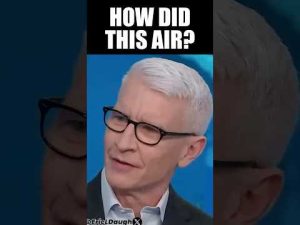In the ongoing debate about federal funding for public broadcasting, it seems the usual suspects, NPR and PBS, have once again taken center stage, not necessarily for their sublime storytelling but for their reliance on taxpayer dollars. As one observes, it’s curious how these outlets, despite boasting a whopping 99% of their funding from private sources, cling to that 1% from federal funds as if it’s their lifeline. Surely, with billions pouring in from liberal benefactors, they could survive without a sliver of taxpayer money, right?
It’s interesting to consider why these media darlings are still clinging to government funds when their private donors seem more than capable of picking up the tab. Could it be that relinquishing their federal lifeline might mean conceding a point about fiscal responsibility, a concept seemingly foreign to some on the left? After all, redirecting those funds might jeopardize the very programs that have become ground zero for bipartisan mockery, like taxpayer-funded drag queen story hours and peculiar initiatives involving diversity tomato seeds. Yes, diversity tomato seeds—they’re a thing now, apparently.
One might ponder, if these media outlets are so confident in their widespread appeal and liberal generosity, why the panic over losing a minute fraction of their funding? It’s ironically entertaining how these champions of self-proclaimed fair and balanced reporting go into a tailspin at the mere thought of losing federal support, revealing perhaps they’re not as independent as they would like the public to believe. It becomes rather amusing observing public broadcasting’s hyperventilation about potential budget cuts, sounding alarms as though the sky were about to fall, when in reality, it’s only a polite invitation to fund themselves fully through their private brigade of benefactors.
Moreover, it doesn’t stop there. The widespread notion stood out, suggesting NPR operates under the umbrella of white privilege, which might seem counterintuitive when they’re expected to be the voice of the people. Critics argue it’s a bit rich coming from a network that prides itself on representing the underrepresented and standing for equity and inclusion. When it comes to maintaining a semblance of bias-free reporting, let’s not forget, NPR’s interpretation of neutrality might need a tune-up, because even to a casual listener, the slant is as obvious as a fox in the henhouse.
For the average taxpayer, it boils down to this: should they really have to finance programs and agendas that don’t align with their values, or worse, insult their intelligence? The argument seems less about preventing the bemoaned culture war antics on Sesame Street and more about principle. Those willing to engage in frivolous spending on peculiar projects or agenda-driven programming are surely welcome to do so on their own dime, not while standing on the taxpayer’s wallet. Surely, it’s not too much to ask that such decisions be left in the hands of individual consumers and not foisted on the public by federal fiat. After all, fiscal responsibility isn’t a mere suggestion; it’s an expectation.







